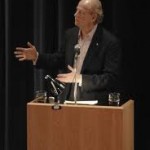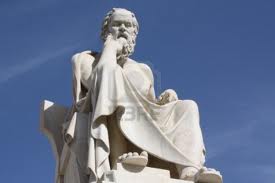My first look at this book (and its author, John Ralston Saul) was here, and the first chapter was summarized here.
Saul called Chapter 2 of The Unconscious Civilization – the second of the speeches he originally gave as the 1995 Massey Lectures in Canada – “From Propaganda to Language”. To bring (Western, or maybe even global) civilization to a more conscious state, to encourage genuine democracy and real citizenship in pursuit of the general good, he advocates fundamental changes in the way that we communicate, and in the role of
education in producing such true and meaningful expression. These are big ideas. Saul is often criticized for his sweeping generalizations. Even his fans might find occasional pronouncements positively tsunami-like in their breadth, force and where-did-that-come-from suddenness. This is also his greatest strength: he describes philosophical and historical forests to a public too often entranced by the trees.
And speaking of sweeping general statements, then, here are my no-more-than-500 words in summary of “From Propaganda to Language” by John Ralston Saul:
- Distinguish knowledge from those who communicate it. Corporatism tends to specialize knowledge, embodying it in the privileged few who ‘own’ it.
- Ideologies invoke some lost “paradise”, to which we can return by following their sacred scripts. Consider the ideological double-think which simultaneously preaches the “American small-town ideal” and global capitalism, which are “direct enemies”.
- In contrast, writers must maintain the independence and doubt “central to a citizen-based society” rather than corporatist certainty. When “knowledge is power”, the role of independent thinkers “is more tenuous today that it has been since the late Middle Ages”.
- Information technology, far from “[creating] unbeatable arguments against doing wrong”, actually contributes to justifying wrong (or obscuring it, via the sheer volume of information).
- Linking “free markets” to democracy and free speech is common political rhetoric. China, for one example, puts the lie to this connection of capitalism with citizenship. Language is manipulated for ideological advantage and corporatist gain, leading to “self-delusion and romanticism”.
- Psychotherapy, rather than leading to improved awareness, has produced “false individualism”, centring on self rather than citizenship. “The narrowly examined life of the passive citizen” contributes to “the unexamined life of the twentieth century”. Not worth living! Socrates shouts.
- Gods and Destiny: Western civilization began when such as Socrates challenged
their predominance, but in the 20th century Destiny has risen again in ideological and economic certainties.
- A “sick civilization” impairs genuine communication via those who “use language as a weapon of power”, but the Socratic ideal of “self-examination” remains potent.
- Contrasting the populist Socrates and his “elitist”, anti-democratic pupil, Plato, Gregory Vlastos has written among “the most important pieces of scholarship of our time”. The apparent discrepancies in Socratic thinking seen in Plato’s Republic actually reflect changes in Plato as he ages. Socrates and other humanist voices have always valued “the disinterested public good” and “the citizen [as] the source of legitimacy.” What is the way we ought to live?
- We need “public language” – honest, independent, in common – while “corporatist language” has three damaging aspects. Rhetoric is “received wisdom”, the language of ‘think tanks’ which produce not genuine thought but the “defence of those who finance them”. Propaganda is the mass selling of such rhetoric, like TV ads except that the stakes are higher (Nazi Germany, The Triumph of the Will). Televisual fascination distracts us from greater societal awareness. Dialect refers to specialized, exclusive vocabularies.
- “Impenetrable academic dialects” are only the lesser evil of failed public education systems; greater is the “betrayal by much of higher education of their wider mission…[to] teach the elites to rise above self-interest and the narrow view”; in its stead is a “relentless drive for narrowness”.
- Lament: “how smoothly the universities are fitting into the corporatist structure” rather than being “centres of active independent public criticism”. Higher education should “teach thought”, not develop MBA programs.
- Last word to Socrates on trial: “examining both myself and others…[is] the very best thing a man can do…”

Socrates at trial, in paint, at 70. Not only self-examination and questions, but apparently lots of hours in the gym. Renaissance man! Buff!
Whew. Cutting to 500 (on the nose — go ahead, count ’em) from nearly 1000 words wasn’t easy – too much work for a blog post, perhaps, but it has me thinking and learning. (And “easy writing makes hard reading,” as the Great Editor might say.) Did you enjoy the sweep of Saul’s ideas? It’s likely unfair to present them so nakedly, but certainly he is unafraid to make bold claims, criticisms and prescriptions. I admire his attempt to go back to first principles, to seek the roots of our modern predicaments. Next, I’ll present 500 of my favourite words in summary of Chapter 3 of The Unconscious Civilization, called “From Corporatism to Democracy”.


